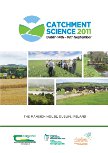
Catchment Science 2011
Catchment Science 2011 14 September 2011 Type Event Proceeding Proceedings from the Catchment Science 2011 Conference which took place in The Mansion House, Dublin from 14 – 16 September 2011 Download Publication (PDF)
14 September 2011
Type Event Proceeding
By Proceedings from the Catchment Science 2011 Conference which took place in The Mansion House, Dublin from 14 - 16 September 2011
Download Publication (PDF)
Catchment Science 2011
14 September 2011
Type Event Proceeding
Proceedings from the Catchment Science 2011 Conference which took place in The Mansion House, Dublin from 14 – 16 September 2011
Download Publication (PDF)
